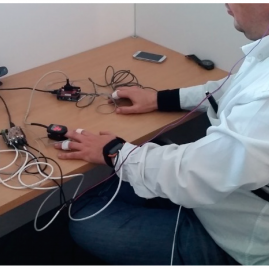Adaptation is a long-standing need in educational/training systems. This is usually based on an underlying user model which gathers information about previous knowledge, preferred learning styles, interaction needs (covering those related to disabilities) or other factors which may be useful to support the learning process. Important progress in this direction has already been made in previous project partners’ projects which were successfully completed, addressing interrelated scientific goals in the following areas: standards and metadata, user modelling, design for all, user centred design, accessibility in user interfaces, assistive technology, machine learning, recommender systems, multi-agent systems and ubiquitous computing.
A natural and increasingly demanded extension of this work in adaptation is to consider more complex sources of interaction data, which may help developing more complete and descriptive user models that support the provision of further and more precise adaptation functionality. One such source of information is user’s emotions. Although this type of data has largely been disregarded by adaptive systems, there is evidence that emotions influence the cognitive process. For this reason, in this project we attempt to integrate cognition with user’s emotions to provide adaptive learning according to an extended user model.
Another interesting topic, which offers a high potential from an educational perspective, is the use of context awareness and ambient intelligence to empower the learning experience. These features are of special value when it comes to provide training and educational services to people with special needs. In this context, the environment can be used as an effective communication tool by means of both explicit and implicit interfaces.
In this proposal we address a number of key issues in the fields of affective computing, context awareness and ambient intelligence. In particular, we study their application in adaptive and inclusive educational contexts. This implies the introduction of new and more complex modelling needs which have not been considered in most previous learning research, along with a broad investigation of related topics, including a) affective interaction by means of natural implicit and explicit interfaces; b) information processing to assess the user’s state by using multi-modal approaches; c) the inclusion of affective information in the user model; d) environment/context modelling; e) the provision of adaptive behaviour; and f) the integration of ambient intelligence in learning.
Indeed, affective computing, context awareness and ambient intelligence applications are not limited to learning. Although one major concern of this proposal is to increase understanding on effective methods for exploiting these concepts to benefit learning, the results of this research may be extended to other relevant application areas of the human-computer interaction field such as supporting the independence of people with special needs or reducing the digital divide facilitating the integration of minorities (migrants, reduced literacy people, etc.)
We conducted pilot activities in the Science Week, which aim to show the participants the research we are doing in order to develop intelligent systems that offer emotional support and personalized service to users of the new technologies.








